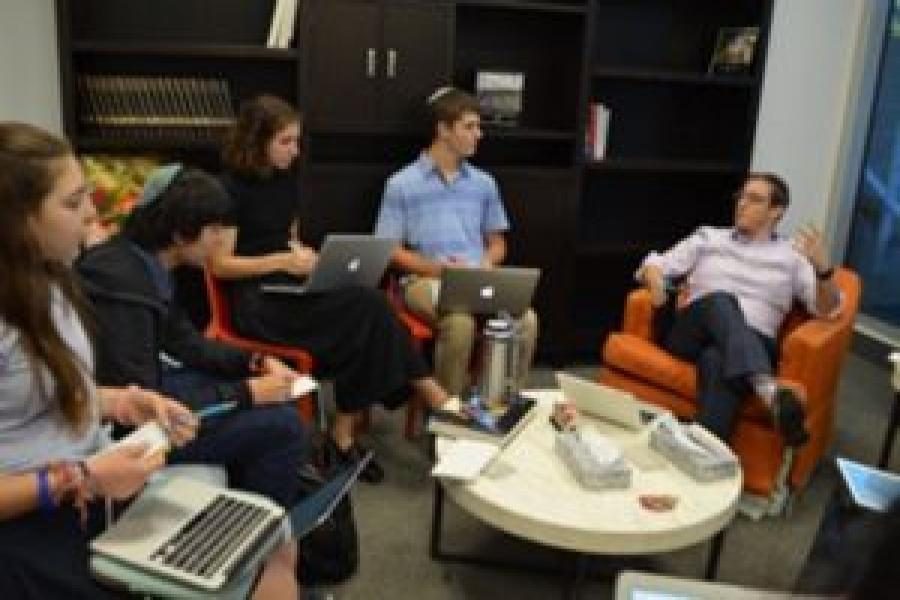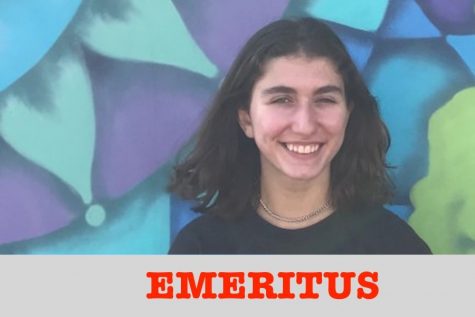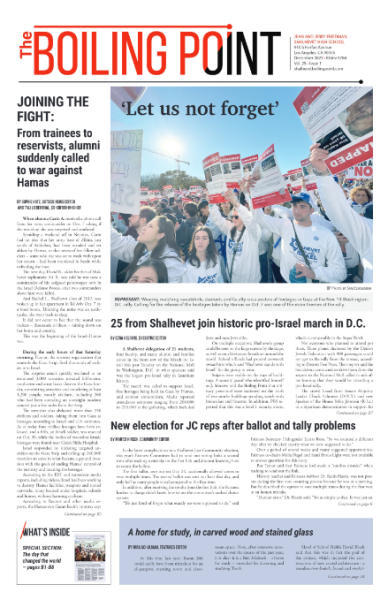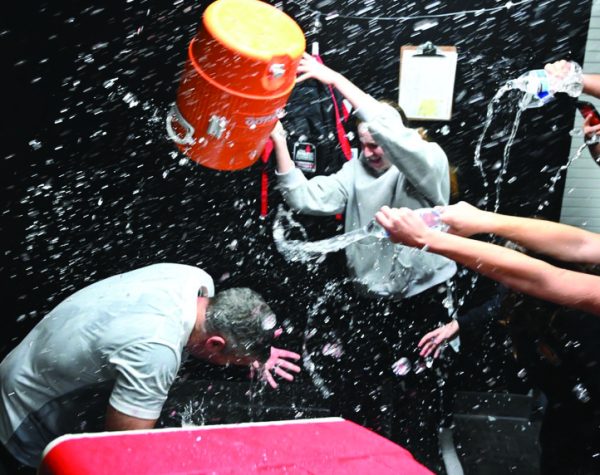5 p.m. dismissal could be solution to schedule issues, Rabbi Segal tells news conference
Rabbi Segal discusses politics, constitution, new schedule and more; club team from Israel may join Glouberman basketball tournament
INTERVIEW: Rabbi Segal responded to over an hour worth of questions ranging from politics, to halacha, to the constitution
September 9, 2016
Shalhevet’s controversial new bell schedule may be revised, the school should keep but update its Just Community constitution, and a team from Israel will play at the Glouberman Basketball Tournament this year, Rabbi Ari Segal told Boiling Point editors at a wide-ranging news conference yesterday.
In addition, the head of school said there are plans for a bathroom in the basement, and that to meet all of Shalhevet’s goals, school should probably end at 5 p.m., not 4:30.
Co-editors-in-chief Alec Fields and Maayan Waldman and all section editors attended the conference, which was held in Rabbi Segal’s office and broadcast live on Facebook – a first for the Boiling Point.
He answered questions for almost two hours on topics ranging from safety drills to Donald Trump, from girls laining at Shalhevet to diversity in the faculty and women leading kiddush.
The most unexpected revelation was that Shalhevet’s second annual Steve Glouberman Basketball tournament, scheduled for November, has invited a club team from Israel, along with nine boys teams and six girls teams from around the U.S, in comparison to 14 total teams last year.
But almost half of the questions were about the new schedule, which shortens lunch period to 30 minutes for freshmen and sophomores and eliminates SWAP for upperclassmen, sharply reducing time when students from all four grades are together.
There are some unintended consequences, things that we foresaw but wanted to wait and see, and I think Shalhevet is always open to change.
— Rabbi Ari Segal, Head of School
“We are definitely concerned about that, it’s something that the administration is looking at very closely,” Rabbi Segal said.
He said the new schedule — which includes two 45-minute MAP (math-arts-P.E. periods) for ninth- and 10th-graders and extra Talmud time, essentially giving them one more class per day than the upperclassmen – had been adopted for good reasons.
School officials have said certain classes, such as math and Talmud, need to meet more frequently, he said.
“Math teachers frequently spoke about how they didn’t have enough contact in terms of meeting time and they needed the frequency of the meeting time,” said Principal Reb Noam Weissman said over the summer. “When we spoke to a number of differently people, a number of different professors, a number of different schools, they also agreed that that was necessary for math classes.”
Rabbi Segal said yesterday that having Talmud four times a week helps build a good foundation for Gemara and creates an “immersive” experience.
But with school in only its second week, he was also hearing some of the new program’s side effects for the first time. He said it would be reviewed.
“There are some unintended consequences, things that we foresaw but wanted to wait and see, and I think Shalhevet is always open to change,” Rabbi Segal said.
“I also don’t think we want to do knee-jerk things, but yes, we see and we’ve heard, mostly from sophomores…that they need a bit more time. The administration is very on top of it — they’re thinking let’s see how this plays out. If it doesn’t, here’s some next things we’ll try.”
Pressed to suggest a solution, Rabbi Segal said one might be to go back to the pre-2010 system, when school ended at 5 p.m.
“If you ask me on a personal level, I’d say, ‘Yeah I’d like 30 minutes more of work, give me two 15-minute homeroom periods in the middle, I think that’s great…,” he said. “How you’d convince students of it, I don’t know, it’d be interesting.”
Because the decision to shorten the day was made so long ago, Rabbi Segal said that issue, too, should be re-assessed.
“I will say this — the students voted to have a shorter day a few years a go…and I said ‘Okay but you guys are gonna lose a lot of your downtime,” he said. “You want to have this incredible dual education…
“In New York those schools go to at least five o’clock — you want to vote to get out at 4:20, fine, but just realize you’re gonna be tired.”
Because the last major schedule change was student-suggested and implemented, editors asked why the new version was executed exclusively by the administration. Rabbi Segal said it was a “pedagogical issue” – meaning it relates to curriculum, which according to the Just Community constitution is outside the influence of student committees.
“They changed it cause it’s pedagogical, and that’s something…the administration has the constitutional right at Shalhevet to do,” Rabbi Segal said, “and they just felt like you were getting an amazing education but there was better.”
On the subject of the constitution, Rabbi Segal said he thought it provided foundational values for the school and should be updated, not discarded. [See related story.]
He also discussed changes in the building, which include the addition of four new classrooms – but no student bathroom – in the basement. He said the administrative team would like to add a bathroom, along with a shade structure on the rooftop, and a three-shower locker room near the gym.
Rabbi Segal said there have been no safety drills for lockdowns and earthquakes because it is up to the security firm Shalhevet hired.
“They’re gonna run drills based on how many drills they think they’re supposed to run,” Rabbi Segal said.
Still, he believes there should be drills for earthquakes and lockdowns.
Many have noticed a new diversity in Shalhevet’s faculty this year. Rabbi Segal it happened by chance, and unintentionally.
“We continue to hire people we think are really talented at teaching or we think can become great at teaching…and whoever that is that is,” he said. “I remember being interviewed, ‘Why haven’t you hired a Sephardic rabbi yet?’ and we said, ‘it’s not intentional, we’re ready, if that person shows up and interviews and is the right fit — great.’”
“I would like to say we had some massive master plan for diversity, but I think it’s much more about who shows up to interview and just picking the best person, it just happens to be more diverse this year.”
Torah Editor Nicole Soussana asked Rabbi Segal if Shalhevet’s stance on allowing women to make kiddush could change given that Morateinu Alyssa Thomas-Newborn said kiddush for the B’nai David congregation while Rabbi Yosef Kanefsky was out of town. He said it would not.
“This is not meant in a dismissive way, but we’re not deciding halacha here based on what B’nai David does on a given Shabbos,” Rabbi Segal said. “B’nai David is a super important congregation in America…and I think they have a very loud voice in many ways in America. But when we talk about the halachic process…we’re talking about the broader community.”
“Shuls are very different from schools,” Rabbi Segal said, “Shuls draw a select group of people who…they’re not identical but there’s a bit of an echo chamber in every shul by the way… We’re trying to do something very different here, we’re trying to create massive diversity.
“Diversity requires compromise…Diversity requires respecting the mean, and I think that’s part of what we’re doing.”
He also said the reason girls at Shalhevet have not been allowed to lain – chant from the Torah – in a women-only setting is that they have not asked to.
“I’m waiting to see when the students are ready to do it,” Rabbi Segal said. “I always think it should be a student initiative, I want students to feel like they’re ready for it…to come forward with a proposal that works for us and for them,” he said.
“I would never say never about almost anything,” he added. “I think the world is a rapidly shifting place, including the halachic world, as hard as it is for us to see.”
Outside News Editor Jacob Feitelberg asked whether a president Hillary Clinton or Donald Trump would be better for Israel.
“I don’t know,” Rabbi Segal said. “I don’t think I could tell you with any degree of certainty who is better for Israel. Some people say Hillary Clinton has had a lot of international diplomacy experience — which she has. I hear often people say she wouldn’t be good for Israel, I’m not sure why people would say that.
“Do I think that Donald Trump is a free-wheeling, Wild West kind of person? Yeah,” he continued. “Do I think his style of negotiation will work? I don’t know, I wouldn’t bet on it, but that doesn’t mean it wouldn’t. I think we all like to imagine that we know what would happen.”
Overall, Rabbi Segal said that he looks to AIPAC and the Israeli government for guidance on who to support in elections.














